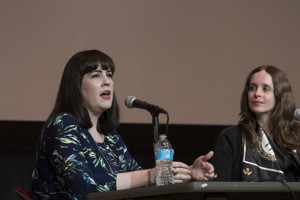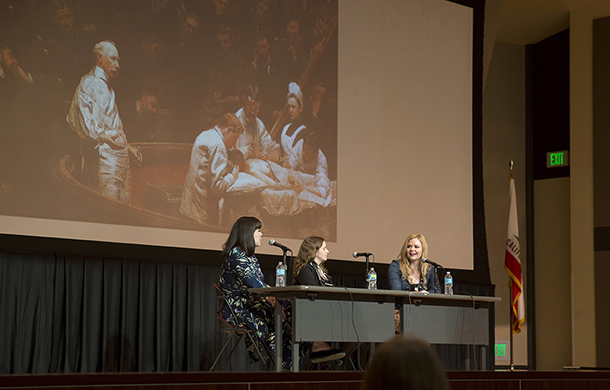
Caitlin Doughty, left, speaks while Megan Rosenbloom looks on during the Visions and Voices event, “Doctor’s Orders for a Good Death.”
It’s not every campus presentation that begins with the question, “How many people here have seen a dead body in person?” But that is exactly how USC medical librarian Megan Rosenbloom opened a discussion titled, “Doctor’s Orders for a Good Death,” on April 6 in the Mayer Auditorium on the Health Sciences Campus.
The presentation, part of the USC Visions & Voices arts and humanities initiative, featured a panel discussion with Caitlin Doughty, a mortician and spokesperson for death acceptance, and Lindsey Fitzharris, PhD, a medical historian and creator of the website, The Chirurgeon’s Apprentice.
When Rosenbloom asked that provocative question, she seemed surprised at the large number of hands raised in the affirmative.
“Over the course of the 20th century, Americans, in particular, have become more and more detached from death,” she said. “And they had fewer interactions with corpses in particular. And that lack of interaction — that sort of detachment — has led to some pretty big impacts on our culture.”
Those impacts featured heavily in the program, which began with readings from upcoming books from both Doughty (From Here to Eternity: Traveling the World to Find the Good Death) and Fitzharris (The Butchering Art – Joseph Lister’s Quest to Transform the Grisly World of Victorian Medicine) before transitioning into a panel discussion with Rosenbloom. Topics ranged from the birth of antisepsis and surgical hygiene, to cultural practices surrounding death around the world, to the benefits of medical students being taught with donated cadavers.
“It’s the emotional experience of cutting into that cadaver that is the thing that sticks with medical students, because it is a rite of passage,” Fitzharris said. “It’s much more than just the training of the doctor. There’s something else there… I think to kind of take that away from medical students would also make it more difficult for them to accept the realities of death with patients.”
Doughty noted that a “good death” is really one in which a person has been clear about their priorities with their loved ones. “If you don’t lay that out, none of it’s going to happen. You’re not going to stumble into a good death. You’re not going to stumble into a well-rehearsed, organized, painless death. It’s just not going to happen.” —Sara Reeve


